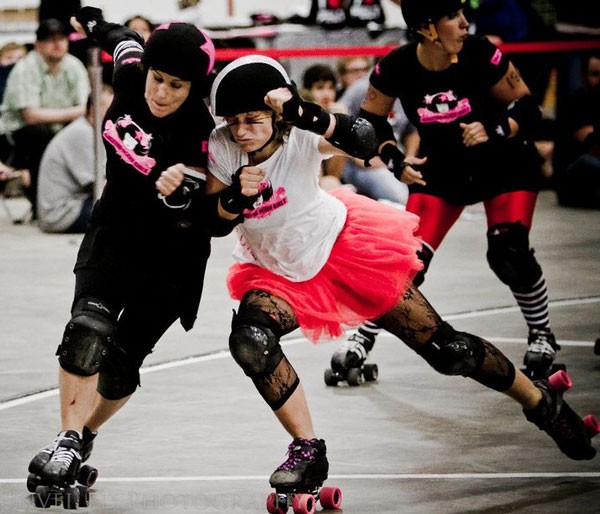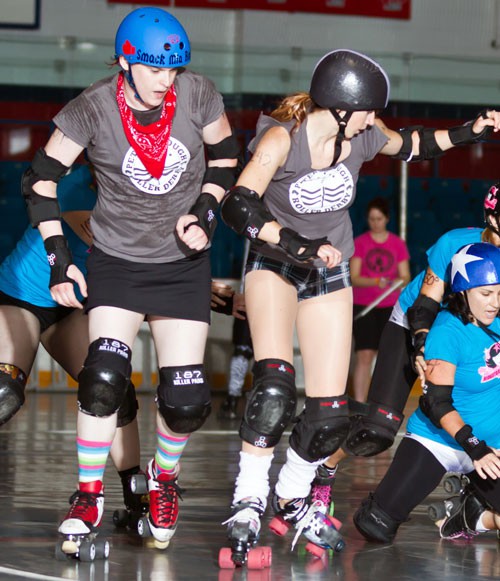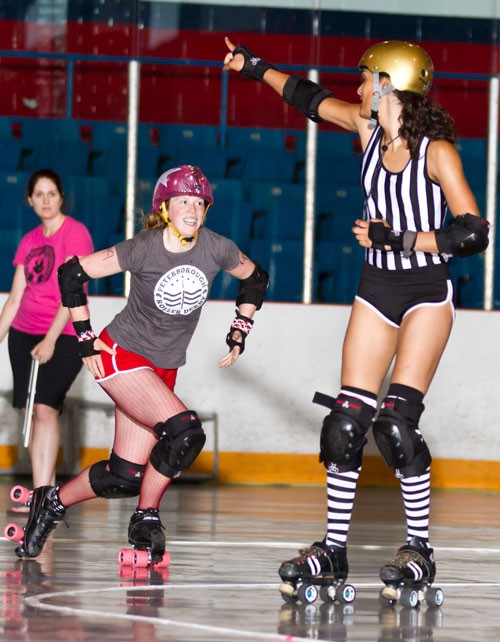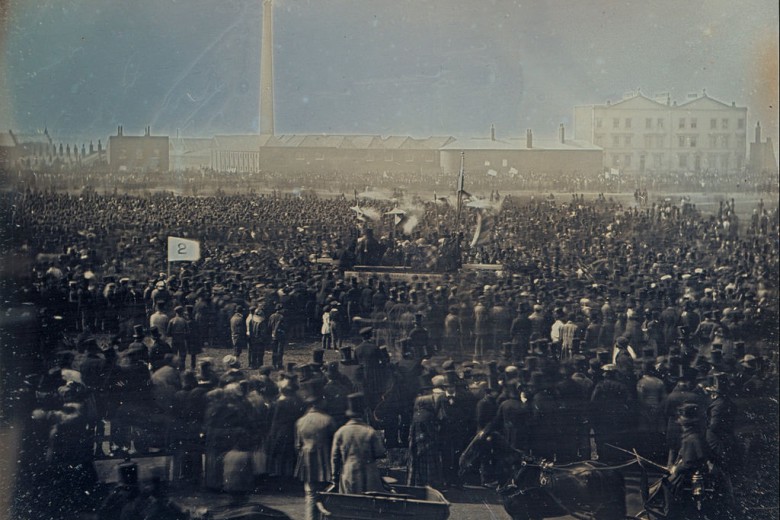
Roller derby is back! The female-dominated sport that sees players battle it out in full contact around a roller skating track has made a comeback in the past decade. While roller derby began in the 1930s as skate-a-thons and experienced a resurgence in the ’70s, the present reincarnation has players embodying badass alter egos, complete with unconventional costumes and stage names, and has become known as a space of feminine empowerment. As the sport gains popularity and leagues attract increasingly diverse members, the question of how to include trans women – women who were born biologically male – has sparked important conversations and at times led to divisions.
Space of female empowerment and community
Nancy Kenny is an actor and playwright whose 2011 fringe festival play, Roller Derby Saved My Soul, explains the transition of a shy, dissatisfied 30-something to a strong and confident athlete. “Roller derby pushes women and shows them they can do things they never had a chance to try or never even thought they were capable of,” Kenny explains. “It really does help women build confidence.”
Part of the attraction of roller derby is that it creates a space in which women encourage one another to be everything that society tells them not to be. “It goes against conventional societal norms,” Kenny continues. “Tough, strong women are not what society trains us to be. That is why it is a fringe sport. If women were fully embraced and accepted as strong, powerful, sexual and athletic beings, I don’t know if derby would have the kind of revival it is experiencing. It fulfills a need.”
Theresa Leishman agrees. Not only is it a place for her, as a mother and veteran of the Canadian Armed Forces dealing with post-traumatic stress disorder, to express herself in a way she typically does not, she has also found it to be a space of mutual support and community.
Unsure of how to deal with her stress load, her obsessive-compulsiveness and other anxieties associated with PTSD, and struggling to maintain her physical health, Leishman, or Commando Momma #338 of Kingston’s Limestone CrusHers, has found a sisterhood in roller derby that she’s never seen elsewhere. “A lot was taken away from me. But now I found a group that loves me – other female misfits that never fit anywhere else,” she jokes.
Leishman appreciates derby’s acceptance of all women regardless of background, age and athletic ability. “You get such a diverse range of women, from students to your professional moms.” This diversity contributes to making derby more than just an amateur sport. It also helps create an empowering and supportive space for women.
Increasing accessibility
For all its emphasis on inclusivity, however, some are questioning if derby is really an empowering space for all women.
Marie Bencze, or Manic Breeze, of the Kingston Derby Girls, spends much of her time helping run the league. Through the Mutual Aid Collective, Bencze and fellow members prompted the league to sell 50 tickets for each bout on a sliding scale. The committee also fundraises and organizes to provide services such as child care, and collects and distributes used equipment for those who could not otherwise afford to participate.
In her efforts to decrease barriers to participation, Bencze, an anarchist, also asked her teammates to consider another aspect of the sport’s accessibility – what an empowering space for women mean for trans women – which pushed many women out of their comfort zones, even with skates off.
Gender policy has been a point of contention in many leagues, opening up difficult conversations about body types and maintaining a safe yet inclusive space for women. Conversations around gender policy were one factor that eventually led to divisions within Kingston Derby Girls and the founding of the city’s newer league, the Limestone CrusHers.
Many leagues in Canada are still developing gender policies, but many have modelled their trans policies after Montreal’s, which states that all players must demonstrate that they have been living full-time as a woman and have had female hormone levels for at least a year. Both of these criteria need to be proven with documentation. Acceptable forms of documentation are outlined in the policy and may include proof of a legal name change to a female name, sex reassignment surgery or evidence that “their testosterone levels are not elevated.”
Bencze was uncomfortable including these stipulations in the Kingston Derby Girls’ policy. “What if someone does not have status and cannot legally change their name? What if people don’t want to or can’t take hormones?” She adds that these requirements would compromise the accessibility of the sport for many women due to individual health, lack of access to the health care system and lack of financial resources to pay for hormone supplements.
Many who have worked on gender policies for the sport assert the need for hormones to address differences between sexes such as muscle mass and physical ability and to ensure safety in such an aggressive sport.

But those developing the gender policy for Toronto Roller Derby (ToRD) found that there was actually no evidence to prove that full-contact, coed sports were more dangerous for athletes. Mia Henderson, or Smack Mia Round, is a trans derby girl who was opposed to incorporating hormones into ToRD’s gender policy and found that some of the most vocal opposition to hormone checks came from her cisgendered (non-trans) allies.
“Cisgendered women in the league recognized that if we were going to have a gender policy, it needed to apply to all women in the league and not just trans women.” She points out that some leagues will state in their policies that players must have “normal hormone levels,” but without stating specifics, calling into question what normal female hormone levels actually are. “Post-menopausal women have different hormone levels than pre-menopausal women, and that doesn’t mean they are not ‘normal.’”

Bratty Cardia, a trans woman and referee for ToRD, echoes some of the flaws with debates around hormones. She questions the prevailing idea that certain hormone levels equal certain body types and that testosterone will automatically make people more athletic and better at sports. “This is just not the case. The fact that we need to even out hormone levels is a concession to sexism and patriarchy.” Policies that tie eligibility to hormone levels put the question of who is able to play the sport in the hands of medical professionals.
The governing board for ToRD is currently in the process of approving a gender policy stating that all players must have been living as a woman or non-male identification for the past year. The Kingston Derby Girls have adopted a similar clause.
Smack Mia Round says that derby is one of the most trans-positive environments in which she has ever been. “When I am with groups of trans folks, trans-ness is always a thing. In derby, I am just one of the girls.”
Leishman notes that these discussions got her thinking about issues she would never have otherwise considered. “I now have trans friends, and I don’t really know if I would have if it weren’t for derby. Roller derby really does push you to look beyond your own sphere. It has definitely done that for me.”
It’s developments like these that confirm for Bencze that the challenging and tedious work of developing gender policies, responding to endless email threads and attending meetings contribute not just to making the sport more accessible, but also to broader goals of gender justice and social justice. “It is empowering to see what we can do, both in the community of derby and in the greater communities we’re involved in. This is how social change happens. We find a setting that gives us strength to really find and be who we are. In roller derby, we have been crossing boundaries and showing the dynamic nature of not only women but all people.”






